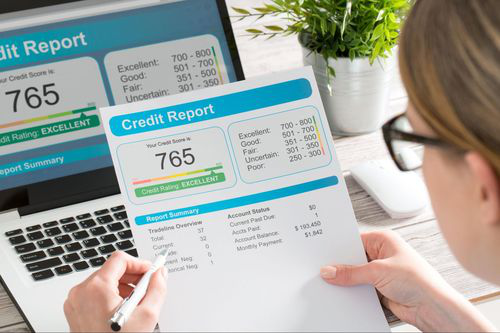How Do Title Loans Affect Your Credit?
A title loan is a type of secured loan where the borrower uses their vehicle as collateral for the loan in order to get fast funding. The amount you can borrow through a bad credit loan option like a title loan is largely determined by the value of your vehicle, along with your income.1 3 When considering a title loan, one of the primary concerns that may come to mind is how title loans affect your credit, both initially after the application and during the repayment process. Understanding how loans can affect your credit score is an important part of making informed financial decisions.
Title loans have the potential to positively or negatively affect your credit score, just like many other loan options. Firstly, if you decide to fully pursue a title loan application, most lenders will pull your credit report. When a lender conducts a credit check during a title loan application, this will be documented on your credit report as a so-called credit inquiry. Having credit inquiries added to the credit report can decrease the applicant’s credit score, but only by a few points in most cases.
Additionally, your actions as a borrower during the repayment process also have the potential to directly affect your credit score. If a title loan is reported to at least one of the major credit bureaus, know that reporting typically includes both positive and negative payment behavior. The three major credit bureaus include TransUnion, Equifax, and Experian.
Positive Ways Title Loans Can Potentially Impact Your Credit
Some of the key ways that your actions as a title loan borrower can positively affect your credit score include the following:
- Making Payments on Time and Keeping Your Loan in Good Standing
- Ultimately Paying Off a Loan, Which is Reported to the Bureau as a Closed Account With Zero Balance
Negative Ways Title Loans Can Potentially Hurt Your Credit
Additionally, some of the instances where your credit can be negatively affected by your actions as a title loan borrower are listed below:
- Missing Payments, Which are Reported to the Bureaus as Delinquency Status after a Specific Period of Time (30 Days, 60 Days, 90 Days, etc.)
- Your Loan is Charged-Off Due To Multiple Payments Having Been Missed
- If You Default on Your Loan, the Vehicle Can Be Repossessed and Reported to the Bureau as Repossessed Status
- If Your Title Loan is Sent to Collections, and the Lender / Loan Servicer’s Attempts to Contact You Do Not Result in the Issue Being Resolved (e.g., Working Out a Payment Plan), the Vehicle Can Be Repossessed
If you are wondering just how significantly a title loan repossession affects your credit, the answer is that according to Capital One, vehicle repossession can potentially stay on an individual’s credit report for 7 years. Essentially, if the lender seizes your vehicle and reports the repossessed status to the major credit bureaus, it will negatively impact your credit score, so avoiding this scenario is imperative. Know that most title loan lenders are often willing to work with you to avoid repossession if you communicate your financial hardship before you default on your loan.
A title loan has the potential to help or hurt your credit report based on the decisions and actions you take during the repayment process. Keep reading to explore the relationship between title loans and credit scores, as well as how title lenders will check your financial and credit history during the application process.
How Do Title Loans Go on Your Credit?
If a title loan is a financial resource you’d like to pursue, you may have questions about some of the key aspects of the process, such as, “Do title loans go against your credit or on your credit?”
The answer primarily depends on whether the title lender or loan servicer will report your actions (whether negative or positive) to one or more of the major credit bureaus. As mentioned above, failing to make payments and defaulting on your title loan can result in vehicle repossession, which significantly impacts your credit score.
If you are interested in pursuing a title pawn as well, you may have similar questions, such as, “Do title pawns go on your credit?” Just like a title loan, if you default on your loan and fail to catch up with your payments, your car can be repossessed. If your lender or loan servicer reports this repossession to the credit bureaus, that can reflect on your credit report for up to 7 years and subsequently cause your score to drop.

Call Our Team
Take the first step and call our toll-free hotline to speak with a specialist.
Does Defaulting on a Title Loan Affect Your Credit?
Defaulting on your title loan can adversely affect your credit score, and this fact cannot be stressed enough. To minimize any negative effects on your credit from title loans, it’s important to make informed decisions as a borrower. Be sure to borrow only what you can afford to repay. Assess your financial situation carefully before taking out a title loan, and consider whether you can realistically afford to fit the payments in your current budget.
Adding to that, if you do not already have one, create a budget to ensure you can make your title loan payments on time. Your payment history makes up around 35% of how your credit score is calculated, so a positive, consistent payment history is crucial for maintaining good credit scores. By establishing an effective budget and prioritizing your loan payments, you can minimize the risk of late or missed payments.
Lastly, be proactive and communicate with your lender or loan servicer if you encounter any difficulties in making your loan payments. They may be able to offer options, such as rewriting the loan or pushing your due date forward in order to give you more time to make a loan payment and potentially help you avoid any negative consequences on your credit.
Do Title Loans Build Credit?
A title loan can go against your credit, but you can avoid the potential negative consequences by paying your loan on time each month and being a responsible borrower!
Additionally, being a responsible borrower can help you learn how to build your credit history. If your title lender or loan servicer reports to one of the major credit bureaus, there are ways that this reporting can be in your favor – but again, it will depend on your actions as a borrower, so it is important to make your title loan payments a priority. Avoid defaulting on a title loan, keep your credit utilization low, and budget for your monthly payment so you can set yourself up for success!

Do Title Lenders Check Your Credit Score?
While it is possible to get a car title loan with bad credit, that doesn’t mean you can avoid a credit check entirely during the title loan application process. Reputable lenders will verify your financial history through a credit check and determine your ability to handle a new debt obligation, as well as understand how you currently handle your finances.
Don’t let your financial history hold you back! If you want to pursue a bad credit loan option like a title loan, you don’t have to fear a credit check because a perfect score isn’t necessary to qualify for financial help through a vehicle-secured loan. Call 855-422-7412 to speak directly to a LoanMart title loan agent today!1
